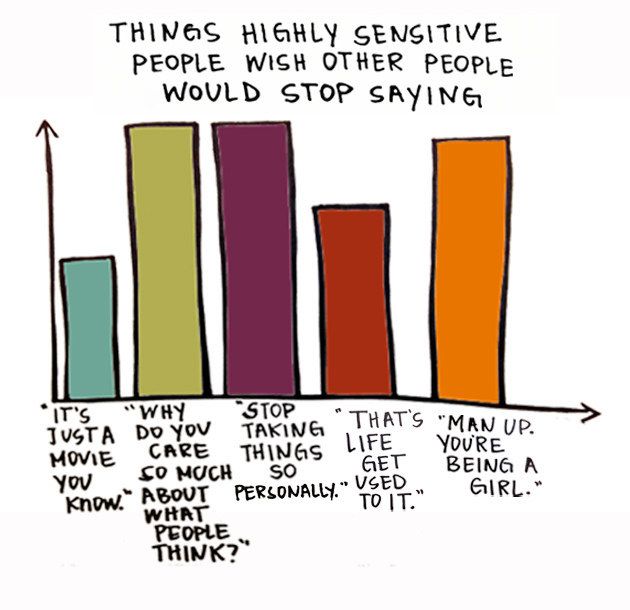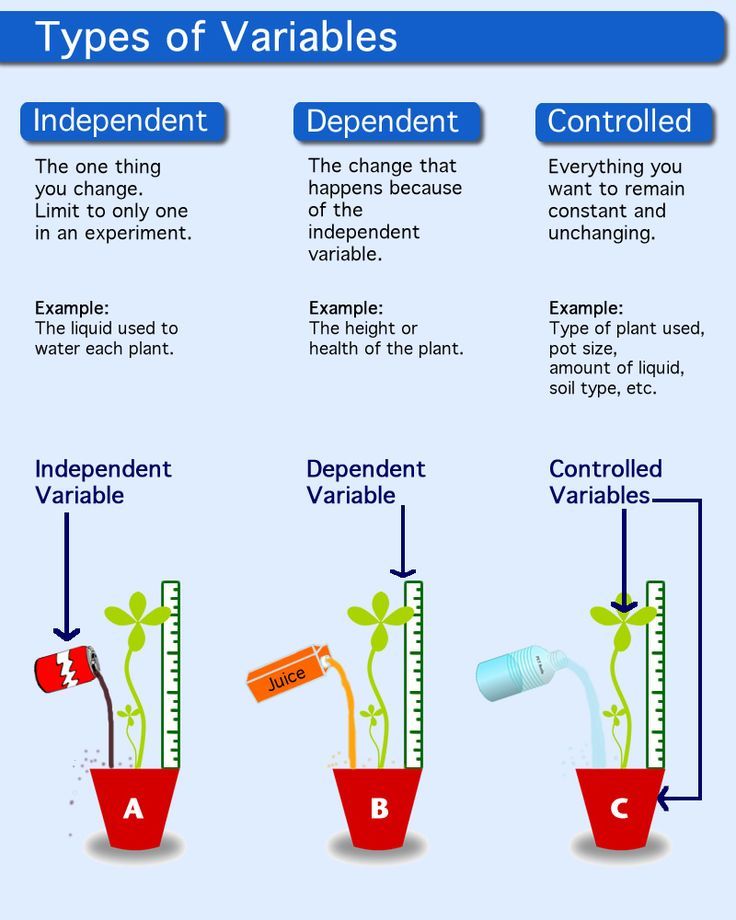Highly sensitive person problems
7 Common Struggles for a Highly Sensitive Person
Research has shown that about 15–25% of the population identify with the unique traits of Highly Sensitive People (HSP).
These traits consist of things like having a rich, complex inner life, being aware of subtleties in their environment and often feeling overwhelmed by sensory input.
Unfortunately, the word ‘sensitive’ is loaded with negative connotations such as being weak, fragile or vulnerable! This is not what it means to be sensitive, and it is definitely not a disorder or disease! It also shouldn’t be confused with things like autism or being introverted.
Highly Sensitive People have very beautiful gifts, such as being empathetic, intuitive and feeling great compassion for others. These traits mean HSP are usually drawn towards professions that help others.
There are many struggles that Highly Sensitive People may face throughout their lives and which stem from the traits not being fully understood, respected or valued.
Identifying these struggles is not meant to place HSP as ‘victims’ to some pre-determined set of traits but, if we can identify what the challenges might be then we can start to educate and empower HSP to respect their authentic way of being in the world.
Here are 7 common struggles of the Highly Sensitive Person.
A Tendency to Avoid Conflict
HSP who find themselves in conflict, or observe conflict between others, will be strongly affected. HSP struggle to witness arguments, hear raised voices or see any form of physical violence because they are highly attuned to the emotions and energy of other people.
They also tend to avoid conflict because they don’t like the thought of upsetting others, or other people being upset with them. A HSP will prefer to maintain harmony and peace in most situations.
Difficulty Setting Boundaries
Highly Sensitive People can also struggle to set boundaries. Even though they are extremely compassionate about the needs of others; they can sometimes neglect their own needs. They tend to put other people’s needs before their own and find it difficult to say ‘no’ or assert themselves. This can be exhausting and takes its toll in the long run!
They tend to put other people’s needs before their own and find it difficult to say ‘no’ or assert themselves. This can be exhausting and takes its toll in the long run!
HSP regularly find themselves absorbing or taking on the emotions of others and can even find it hard to distinguish between their own emotions and the emotions of other people.
Easily overwhelmed
Being so attuned to their environment and their senses means that their nervous system can very easily become overwhelmed.
HSP are also very conscientious; they strive towards perfection and do their best to avoid making mistakes. This mindset means they are very likely to achieve a lot of success in their life, but because they tend to take on a lot of responsibilities, this can lead to overwhelm, exhaustion and burnout.
Feeling Misunderstood
There’s a strong sense of being ‘misunderstood’ or feeling different from others. HSP question the ‘mainstream’ and are always reflecting, wondering and asking ‘big’ questions about the meaning of life.
This means they’re also likely to be more in touch with the spiritual or non-material aspect of reality. This sensitivity and awareness of the spiritual path can be overwhelming at times.
Overthinking
HSP can spend a lot of time thinking, analysing and reflecting on situations. Their overactive mind means they can be prone to emotional overwhelm and burnout. If left unchecked those who are highly sensitive are more likely to experience periods of extreme anxiety, stress, guilt or even shame.
Physical Pain and Illness
Their sensitive nervous system means they are very aware of changes in their physical body and might have a lower tolerance to pain or simply be more aware of the shifts that take place in their body. HSP are easily affected by a lack of sleep, a change in routine or diet. They’re more likely to experience physical illness and bodily pain, such as fibromyalgia or frequent migraines.
Neglecting Self Care
HSP are more likely to work in the helping profession such as being a teacher, nurse, doctor, therapist, coach or counsellor.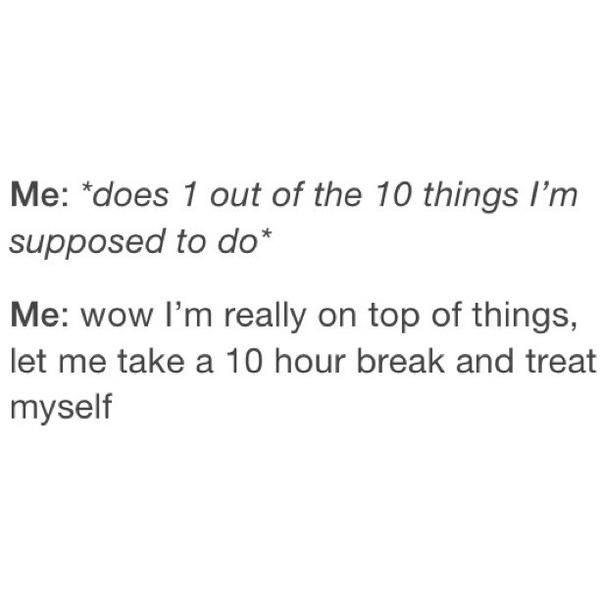 They thrive in these kinds of roles because they are so empathetic and sensitive to the feelings and needs of others.
They thrive in these kinds of roles because they are so empathetic and sensitive to the feelings and needs of others.
However, they are more prone to anxiety, stress, overwhelm and burnout. This means it is even more important for HSPs to engage in acts of self-care, build emotional resilience and have a roadmap to maintain their emotional, mental and spiritual well-being.
So, what does having these struggles mean for the HSP?
As humans, we all have unique ways of perceiving the world. This also means our needs are different from person to person.
Not all HSP will have the same struggles and of course, many people who don’t identify with being highly sensitive will also relate to the challenges listed above!
These struggles are not weaknesses or limitations of being a highly sensitive person, but they are commonly shared experiences. If we acknowledge the experiences of HSP as being valid then, we can also explore ways of nurturing certain skills such as setting boundaries, practising self-care and building greater resilience.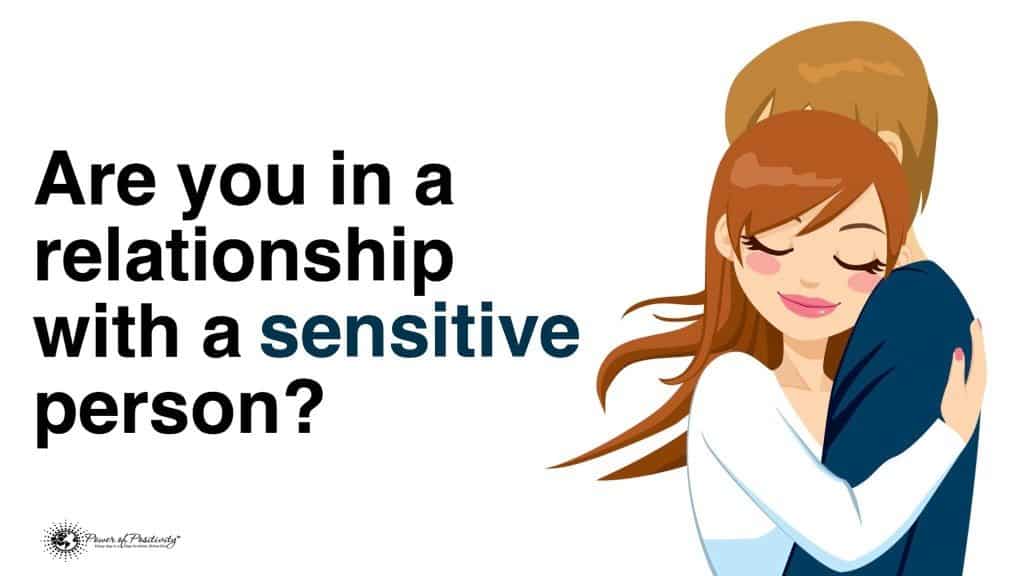
7 Common Problems You Might Be Facing as a Highly Sensitive Person (And What to do About Them) — Living Better Lives Counseling LLC Living Better Lives
Massiel Bradberry
Tips, Mental health
Massiel Bradberry
Tips, Mental health
Has a trip to the grocery store ever sent you home in a panic? Was it the fluorescent lights buzzing? The sticky feeling of your sneakers on the floor? Maybe it was the squeaky wheel on your grocery cart or the strong smell of fresh paint? Maybe it was the awkward small talk with an old friend you saw or the interaction you had with the cashier. Or, maybe, it was all of it.
If you’ve ever experienced being overwhelmed like this, you might be a highly sensitive person and you aren’t alone. Nearly 20% of people are highly sensitive and face the same common issues.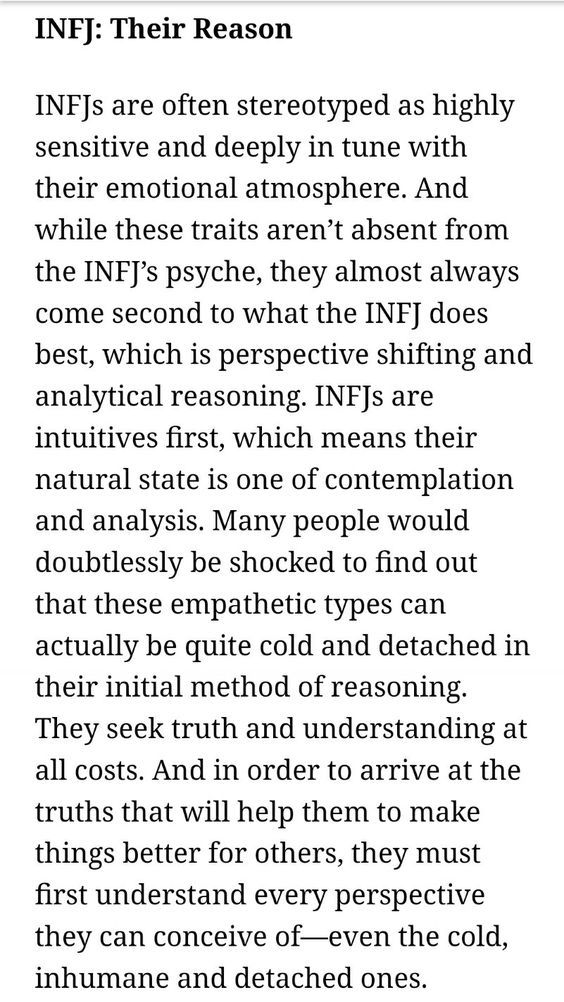 And while highly sensitive people might experience similar challenges, let me be clear that sensitivity is in no way a character flaw.
And while highly sensitive people might experience similar challenges, let me be clear that sensitivity is in no way a character flaw.
Being a highly sensitive person is not a diagnosis, and we discourage the use of it as a negative label for yourself and others. The list we are sharing today is intended to help highly sensitive people feel validated and understand why they may feel a certain way. This list can also be a helpful tool for friends and family of highly sensitive people.
Being sensitive has a negative connotation for a lot of people, especially if they have been accused of or labeled with it in the past. We hope we can help reframe the way people see sensitivity.
The highly sensitive person (HSP) has a sensitive nervous system, is aware of subtleties in their surroundings, and is more easily overwhelmed when in a highly stimulating environment.— Dr. Elaine N. Aron
You might be a highly sensitive person if…
You are easily overwhelmed by things like bright lights, strong smells, coarse fabrics, or loud noises
You often feel emotionally exhausted
You struggle with doing things under pressure
After spending time with others or after a busy day, you need to withdraw into your bed, dark room, or somewhere you can have privacy and relief
You struggle with setting boundaries, and dislike confrontation
You are highly intuitive
People often assume you are shy, timid, or introverted
You avoid violent movies and TV shows
You avoid upsetting or overwhelming situations
You notice or enjoy the small things or subtleties that other people sometimes miss
You have been called sensitive or dramatic, especially as a child
You are creative and have a vivid imagination
You think about or prepare for the worst-case scenario in almost all situations
HSP facts
30% of highly sensitive people are introverts
The HSP trait is found in 15 to 20% of the population
In some cultures, HSPs are more valued.
 In cultures where it is not valued, HSPs tend to have low self-esteem
In cultures where it is not valued, HSPs tend to have low self-esteemHSPs are prone to high functioning anxiety
HSP is common in people with ADHD
HSP is not a disorder, it is a personality trait also called sensory processing sensitivity
HSP are more likely to suffer from asthma, eczema, and allergies
7 PROBLEMS YOU MIGHT BE FACING AS A HIGHLY SENSITIVE PERSON (AND WHAT TO DO ABOUT THEM)
You often feel emotionally exhausted.
For a HSP, feeling drained and exhausted emotionally, mentally, and physically, is a constant struggle. There are a lot of reasons for this since everything can be overwhelming for a highly sensitive person. Some reasons you might be tired include: absorbing people’s emotions, exerting too much energy or focus, ignoring your own boundaries, holding back your authenticity, too little sleep, constantly being “on” and more.
What can you do?
Remember that you are allowed to hold other people’s emotions without carrying them throughout your day/week/month.
 Ask yourself whose emotions you’ve been holding and allow yourself to set them down now.
Ask yourself whose emotions you’ve been holding and allow yourself to set them down now.Schedule breaks throughout your day to rest and feel grounded.
Prioritize self-care.
Create, communicate, and stick to your boundaries.
Holding back your authentic self takes a lot of energy and will eventually take a toll on your wellbeing. Remind yourself as much as you can that you are enough exactly as you are.
Prioritize your sleep! Create a solid bedtime routine so you can look forward to sleeping.
You are easily overwhelmed and/or distracted by physical stimuli like bright lights, strong smells, coarse fabrics, or loud noises.
They might not seem like much to some people, but it’s often the little things like a fuzzy TV, blinking lights, subtle beeping, or an itchy sweater that can overwhelm highly sensitive people. If this sounds like you, you probably know that even though you can identify what is bothering you, you can’t always put into words why it is bothering you.
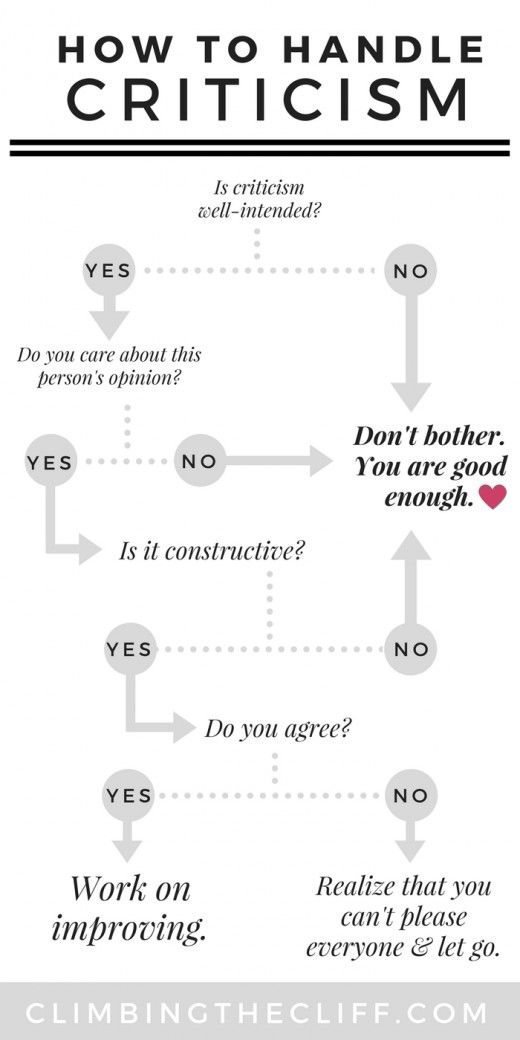 HSPs process all stimuli more deeply than non-sensitive people, so the things that seem small and meaningless to others can seem big and overwhelming to HSPs.
HSPs process all stimuli more deeply than non-sensitive people, so the things that seem small and meaningless to others can seem big and overwhelming to HSPs. What can you do?
Create a safety kit to take with you when you leave your home. When creating your kit, think about your senses and what will comfort them. Some things to include: noise-canceling headphones, sunglasses or a hat, a light scarf, blanket, or jacket, gum, mints, water, reliable snack, comforting smell like herbs, lotion, oil, or spray.
Feeling comfortable physically, mentally, and emotionally, is very important for HSPs, so if this is you, be sure to prioritize your comfort. Even if you don’t need the extra socks in your bag, just having them there might be enough to keep you comforted.
Alone time is a necessity.
Have you ever spent a day out with people, and felt like you needed at least 5 to 7 days of alone time to recover? Same.
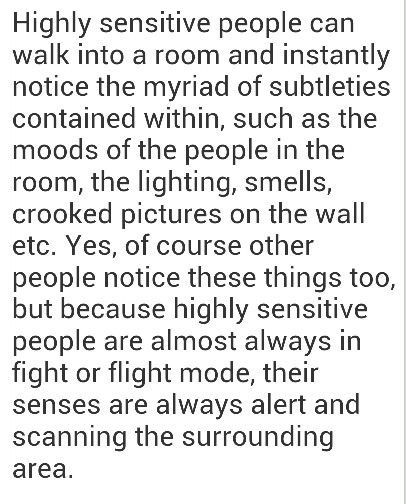 HSPs tend to exert a lot of energy require alone time to feel balanced again.
HSPs tend to exert a lot of energy require alone time to feel balanced again. What can you do?
If you can, set aside two hours each day for intentional but unstructured alone time. Some ideas for what to do are: spending time in nature, reading, watching a movie, making art, taking yourself out for a date, or meditating.
Schedule days in advance throughout the month and year for just you. Think of these as important dates.
Treat your scheduled alone time like you would treat scheduled time with a friend. Try your best to not schedule over this time or use it to finish work, scroll mindlessly on your phone, or offer to help someone with a favor.
You struggle with setting and communicating boundaries.
Because HSPs are more emotionally aware than other people, and they feel compassion for people’s situations, they can often end up saying yes to a lot of things they don’t want to do.
 They do this to please the people around them, avoid conflict, and keep the peace.
They do this to please the people around them, avoid conflict, and keep the peace.What can you do?
Practice boundary setting. This looks like first noticing what boundaries you need and making yourself aware of them. Then, communicate your boundaries to whoever needs to hear them. Remember that their reaction is not your responsibility. Click here for a more in-depth guide for setting and communicating boundaries.
Remember that your needs are just as valid and important as the needs of other people.
You avoid uncomfortable or overwhelming situations.
Because HSPs are prone to anxiety, it’s common to struggle with and avoid uncomfortable or overwhelming situations. There is nothing wrong with choosing to opt-out of a party because being in a crowd of people is not exactly your idea of a good time. Just make sure you aren’t opting out of all situations and opportunities that have a possibility of being uncomfortable or overwhelming to you.
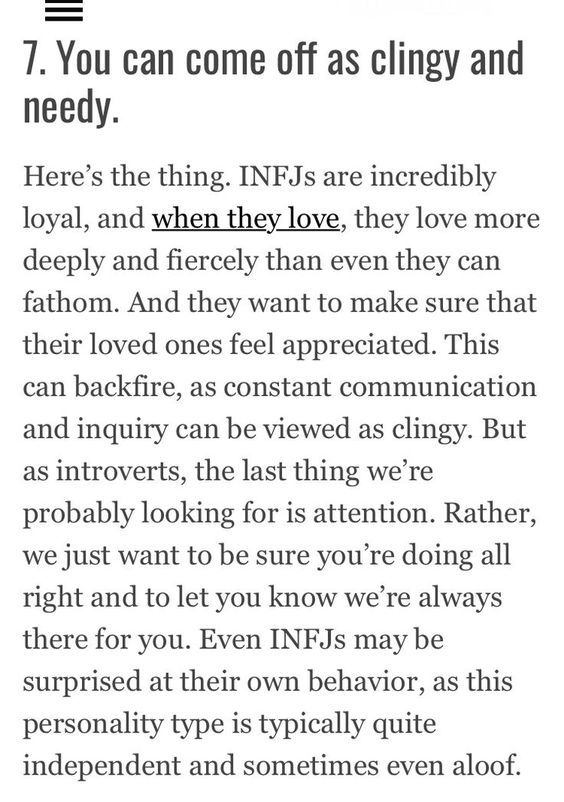
What can you do?
Remember that growth happens when we are uncomfortable. Feeling your feelings can be highly uncomfortable, but it is necessary to heal and move through difficult emotions.
Start small. If you struggle with social anxiety but hope to make friends, start small by saying hi to your neighbor or complimenting the barista’s earrings.
Practice doing uncomfortable things. If you want to feel more confident being out alone, practice! Start by going to the movies alone, then to coffee, etc. Eventually, with practice, you will feel more confident.
People often misunderstand you.
If you’ve grown up feeling like the odd one out, the black sheep, or like you don’t ever seem to fit in, you aren’t alone. HSPs often feel misunderstood by most people. Other, non-sensitive people tend to assume HSPs to be shy, timid, or introverted, especially of highly sensitive children.
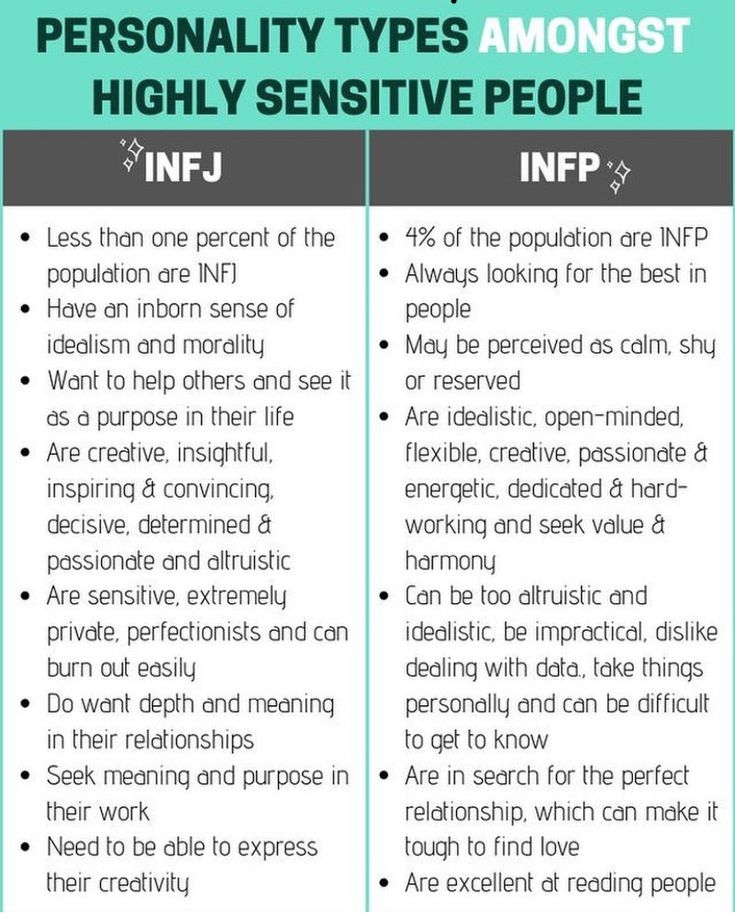 Along with seeming shy, HSPs are sometimes told they are too sensitive and need to toughen up, or they are too dramatic. Feeling constantly misunderstood is exhausting! But know that your authentic self is worthy of appreciation and love. There are people who will understand and accept you in your wholeness, you just might not have found them yet.
Along with seeming shy, HSPs are sometimes told they are too sensitive and need to toughen up, or they are too dramatic. Feeling constantly misunderstood is exhausting! But know that your authentic self is worthy of appreciation and love. There are people who will understand and accept you in your wholeness, you just might not have found them yet.What can you do?
Trust that the right people will slow down enough to see you (trust me, they’re looking for you too).
Reach out to another HSP about how you are feeling. Validation is important for highly sensitive people. If you don’t have someone like this, click here for tips for making friends as an adult.
Be secure in yourself by practicing self-acceptance and self-compassion. When you feel secure in yourself, you will notice other people second-guessing you less.
Ask yourself who you are looking to for acceptance. Make sure you are the first person on the list.

Remember, it is not your responsibility to correct other people’s perceptions of you.
Your inner critic tends to be loud.
HSPs can be their own worst critic. Every small mistake, every criticism, and every awkward interaction has the possibility of lingering in the head of a highly sensitive person for days, even years. Can you relate? HSPs often struggle with overthinking, feeling like an imposter, and feeling like they are always doing something wrong.
What can you do?
Practice techniques for managing anxiety like reframing thoughts, mindfulness exercises, and affirmations.
Talk to a mental health professional if your inner critic is overwhelming and affecting your daily life.
One last thing
Don’t let the challenges listed here discourage you. Despite these struggles, being a highly sensitive person is anything but a flaw. HSPs are some of the most insightful, creative, open-minded, thoughtful, empathetic, talented, and gentlest people you will ever meet.
Highly sensitive people are often wonderful friends and loving partners because they notice little details that other people might miss. They can be great helping professionals because of their ability to help people feel seen, and understood. HSPs can also have more insight into their own mental and emotional journey since they are naturally introspective. Maybe that is what has lead you here to learn more about yourself. I hope this list has helped you feel empowered.
If you are not a HSP, but you know someone who is, thank you for taking your time to read this. Your effort to understand them is so appreciated.
Sources: Healthline.com, HSPerson.com, Additudemag.com
Want to read more? CATCH UP ON OUR LATEST BLOGS BELOW.
Resources for caregivers, parents, and anyone impacted by mass-violence
In response to the Uvalde, Texas, School Mass Shooting
We are grieving along with our teachers, first responders, ER workers, families, communities of color, and everyone affected by the ripple effects of this collective trauma. Please read , save, and share these resources with anyone who may need them.
Please read , save, and share these resources with anyone who may need them.
Get To The Root Of Your Stress: 5 Things That Make You Vulnerable To Stress
Stress is a state of mental or emotional strain or tension resulting from adverse or very demanding circumstances. It is the body’s physical response to a real or perceived threat, demand, or danger.
Everyone experiences stress at different levels. Even when the same stressors are present, our experiences can be different. Certain groups experience higher levels of stress, for example, communities of color, LGBTQIA+, women, and parents.
Stress isn’t always harmful. For example, think about the motivation you feel to study for your next exam, or the urge to make a to-do list on a Sunday. These are positive ways that stress can help you focus and complete tasks.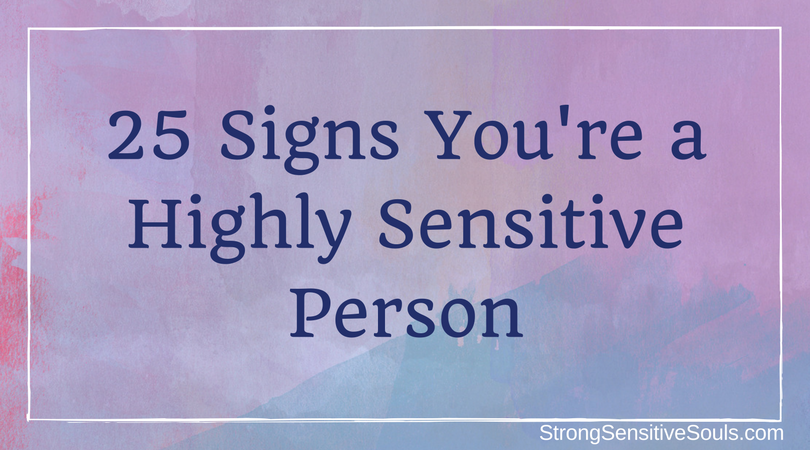 But when stress is frequent and intense, it can affect your overall health, resulting in a reduced quality of life.
But when stress is frequent and intense, it can affect your overall health, resulting in a reduced quality of life.
This is why we want to help you get to the root cause of your stress, understand the ays it manifests for you, and learn preventative tools for coping with stress. Because you deserve a healthy, happy life.
7 Common Problems You Might Be Facing as a Highly Sensitive Person (And What to do About Them)
Has a trip to the grocery store ever sent you home in a panic? Was it the fluorescent lights buzzing? The sticky feeling of your sneakers on the floor? Maybe it was the squeaky wheel on your grocery cart or the strong smell of fresh paint? Maybe it was the awkward small talk with an old friend you saw or the interaction you had with the cashier. Or, maybe, it was all of it.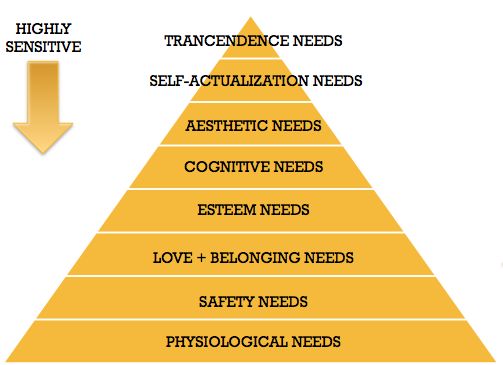
If you’ve ever experienced being overwhelmed like this, you might be a highly sensitive person and you aren’t alone. Nearly 20% of people are highly sensitive and face the same common issues. And while highly sensitive people might experience similar challenges, let me be clear that sensitivity is in no way a character flaw.
Being a highly sensitive person is not a diagnosis, and we discourage the use of it as a negative label for yourself and others. The list we are sharing today is intended to help highly sensitive people feel validated and understand why they may feel a certain way. This list can also be a helpful tool for friends and family of highly sensitive people.
Being sensitive has a negative connotation for a lot of people, especially if they have been accused of or labeled with it in the past. We hope we can help reframe the way people see sensitivity.
ADHD and Women Part 2: Practical Tools and Interventions for Coping with ADHD
In our last blog about ADHD, we discussed what ADHD is, how it typically manifests in women, information on diagnoses, and resources.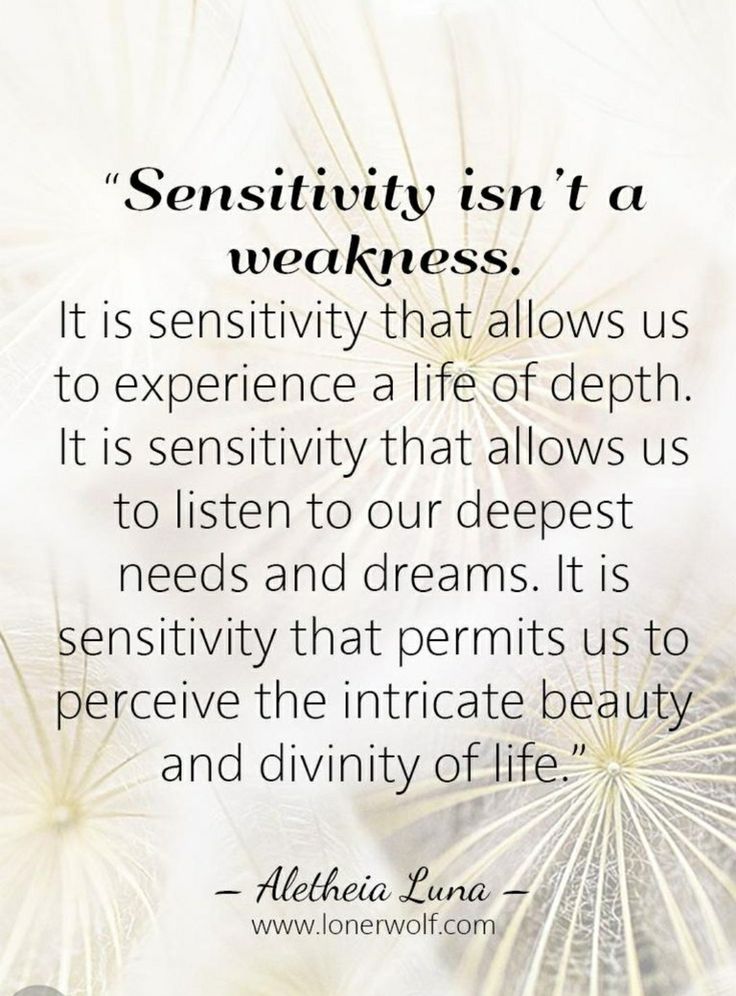 Today we’re digging in deeper and sharing real, meaningful ways you can combat the symptoms of ADHD. From time management to emotional regulation and sorting paper chaos, these research-based strategies will provide you with straightforward approaches to ease stress and overwhelm so you can live a better, more satisfying life. Before we get started, let us remind you that you don’t need to do all the strategies mentioned to be productive and successful. Find what techniques resonate with you and leave the rest. Honor your humanness. It’s important to be gentle with yourself on your mental health journey.
Today we’re digging in deeper and sharing real, meaningful ways you can combat the symptoms of ADHD. From time management to emotional regulation and sorting paper chaos, these research-based strategies will provide you with straightforward approaches to ease stress and overwhelm so you can live a better, more satisfying life. Before we get started, let us remind you that you don’t need to do all the strategies mentioned to be productive and successful. Find what techniques resonate with you and leave the rest. Honor your humanness. It’s important to be gentle with yourself on your mental health journey.
PRACTICAL TOOLS AND INTERVENTIONS FOR ADHD MENTIONED:
The Pomodoro Technique
OHIO Technique
Evening Rituals
Four-Field Strategy
Bullet Journal
Mindfulness Techniques
Working from home - STACC
Pragmatic and Concrete Tips
ADHD and Women
You keep losing your phone, locking your keys in the car, you’re constantly late and feel emotionally overwhelmed. You feel you can never pay attention, you start a lot of projects which you never end up finishing, and you are constantly feeling burnt out. Maybe someone in your life has told you “you might have ADHD” or maybe you’ve been hearing more about the signs and symptoms on Instagram or TikTok and something resonates in you. Whatever the reason, educating yourself is the first step in getting treatment for the symptoms that may be wreaking havoc in your life.
You feel you can never pay attention, you start a lot of projects which you never end up finishing, and you are constantly feeling burnt out. Maybe someone in your life has told you “you might have ADHD” or maybe you’ve been hearing more about the signs and symptoms on Instagram or TikTok and something resonates in you. Whatever the reason, educating yourself is the first step in getting treatment for the symptoms that may be wreaking havoc in your life.
Today we will be talking all about ADHD and women, why it goes unnoticed, common symptoms, if a diagnosis matters, and resources to help you gain control of your life.
BIPOC Mental Health Month: A Brief Guide
July is BIPOC Mental Health Month. We recognize the many layers of barriers that prevent people of color from receiving the support they need. We believe that all people deserve access to health care, especially in a world where Black, Indigenous, and people of color are systemically discriminated against. In an effort to continue advocating for the Black community and other underrepresented communities, we put together this brief guide on BIPOC Mental Health Month.
We believe that all people deserve access to health care, especially in a world where Black, Indigenous, and people of color are systemically discriminated against. In an effort to continue advocating for the Black community and other underrepresented communities, we put together this brief guide on BIPOC Mental Health Month.
8 Daily hacks for coping with social anxiety.
Anxiety is a feeling of worry, nervousness, dread, and uneasiness typically about an imminent event or something with an uncertain outcome. Social anxiety is a feeling of worry or nervousness focused mainly on social interactions. To better understand social anxiety, let’s start by learning the main components that anxiety is created and sustained by:
Physiological
Rapid heart rate
Sweaty palms
A lack of appetite
Cognitive
Anxious thoughts
Predictions
Judgments
Behavioral
Avoiding certain people, places, or situations
Difficulty saying “no” and honoring boundaries
Tendency to snap at others with little warning
Most people with anxiety experience all 3 parts together. If your professor emails you and asks to speak after class tomorrow, you might experience your heart drop, and your hands begin to sweat (Physiological). Then you might notice yourself starting to worry, and creating scenarios about what they will tell you (Cognitive). Then you might put it off by skipping your next class and finally struggling to make eye contact once you’re there (Behavioral).
If your professor emails you and asks to speak after class tomorrow, you might experience your heart drop, and your hands begin to sweat (Physiological). Then you might notice yourself starting to worry, and creating scenarios about what they will tell you (Cognitive). Then you might put it off by skipping your next class and finally struggling to make eye contact once you’re there (Behavioral).
When we struggle with anxiety all three components happen almost automatically. That’s why to challenge social anxiety, we must also challenge the three components. The following daily hacks utilize these components.
How to tell someone to consider counseling
To witness someone who you care about suffering or struggling can be difficult. It can feel heartbreaking to know that that person could benefit from professional help and yet not see them take that step. Approaching a loved one with the, “Hey, I think you need to talk to someone.” can be a challenging task, but one that we think we can help you navigate.
Approaching a loved one with the, “Hey, I think you need to talk to someone.” can be a challenging task, but one that we think we can help you navigate.
3 Ways you're self-sabotaging and how to stop
While it’s not always obvious, sometimes we can be our own worst enemy. We do things like procrastinate, push people away, drink excessively, set unrealistic goals, and break our own boundaries. We don’t do these things because we’re broken or crazy, and we don’t do them because we lack willpower or discipline. Self-sabotage isn’t about being lazy, it’s about you doing your best to cope. Sabotaging yourself, or being in control of certain areas in your life might give you a false sense of control. This might feel safer rather than allowing yourself to be vulnerable to being hurt by something or someone. Give yourself some compassion for trying to cope, and survive, however that has looked like. And remember, who you are and who you have been is not who you will always be. You are always allowed to start new and change old patterns and we’re here to help along the way.
Give yourself some compassion for trying to cope, and survive, however that has looked like. And remember, who you are and who you have been is not who you will always be. You are always allowed to start new and change old patterns and we’re here to help along the way.
How to go BACK to therapy: Returning to therapy after a break
Like any journey, the journey to mental health and wellness might include detours, starts and stops, long pauses, and unexpected factors at play. Choosing to return to therapy is BIG and your dedication to your mental health doesn’t go unnoticed. Whether you haven’t spoken to your therapist in months and are feeling anxious about making the call, you’ve “finished” therapy and are considering returning, or you ghosted your therapist and feel awkward about reaching out again, this is for you. Here are 5 tips for going BACK to therapy.
Here are 5 tips for going BACK to therapy.
Tagged: tips, stress
how to survive for people who feel everything
It is common to think that excessive emotional reactions are something to be dealt with, as they destroy relationships, provoke conflicts and become the cause of many other rash acts. However, the author of the book “I've had enough! How to live with emotional sensitivity ”Imi Lo thinks completely differently and says that people who live in the world of feelings and perceive everything around them through them can actually see and feel what others cannot see. To do this, you need to accept your high sensitivity and realize that this is not a weakness, but, on the contrary, a strength. We tell you who emotionally sensitive people are and what advantages they have. nine0003
Imi Lo
Mann, Ivanov and Ferber, 2020
Who are emotionally sensitive people
An emotionally sensitive person in the most general sense is a person who has a greater range of emotions than anyone else, and perceives the world and the events taking place in it sharp, bright and sensual.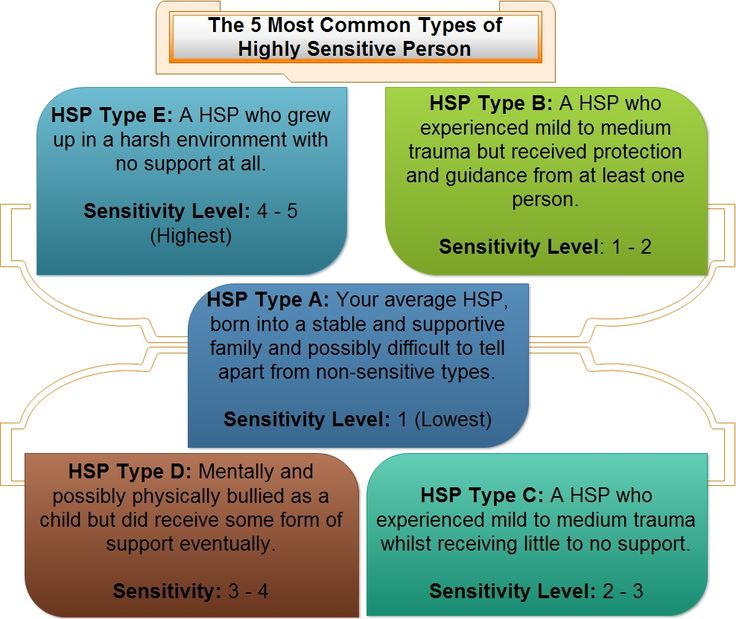 There are five signs of emotional sensitivity:
There are five signs of emotional sensitivity:
-
Depth, intensity and complexity of emotions.
-
Increased empathy and sensitivity
-
High level of susceptibility.
-
Rich inner world filled with feelings and vivid imagination.
-
Creativity and existential anxiety.
These signs can determine whether you belong to the category of emotionally sensitive people.
Depth, intensity and complexity of emotions
If you are a person with high emotional sensitivity, it is as if you exist in the world of emotions and do not think of yourself beyond it. You perceive any events acutely, and you feel truly alive only when you feel something. At the same time, emotions can be not only bright, but also changeable: here you are at the peak of euphoria, and the next second you experience deep sadness. nine0009
Perhaps you approach everything with passion and can love strongly, grandiosely and without a trace, therefore, strive to create strong bonds with people, things and places, which makes it difficult to say goodbye to them, even if it is necessary.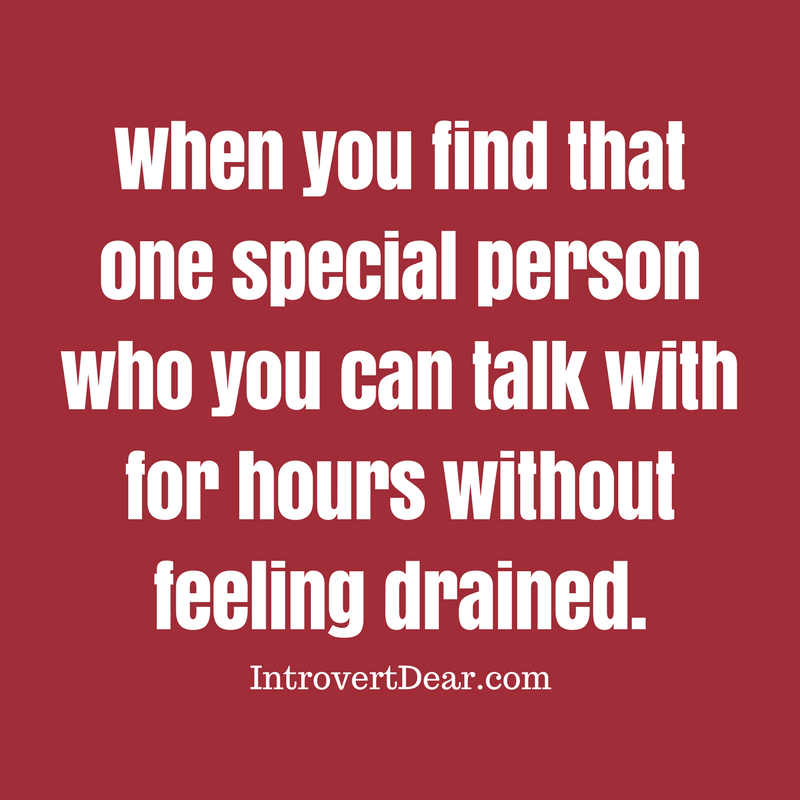
Increased empathy and sensitivity
Probably from an early age you were interested in the lives of others, you were worried even about people who had nothing to do with you. You may also feel a stronger connection with animals and nature, the other person's inner world and their physical sensations. Surely it will not be difficult for you to understand what your interlocutor feels and why he feels this way - and you feel it so clearly that sometimes other people's experiences are perceived as your own. nine0009
You tend to be empathetic towards people, and in close relationships you can romanticize and idealize your friend or partner, forgiving him many shortcomings simply because you deeply feel his inner world. Moreover, some highly sensitive people have a low pain threshold, suffer from misophonia (intolerance to certain sounds), hyperacusis (sensitivity to certain frequencies and strengths of sound), and allergies.
High susceptibility
You do not tend to be satisfied with superficial knowledge, because thanks to empathy and sensuality, you can penetrate the very essence of things, see relationships and important details that many miss.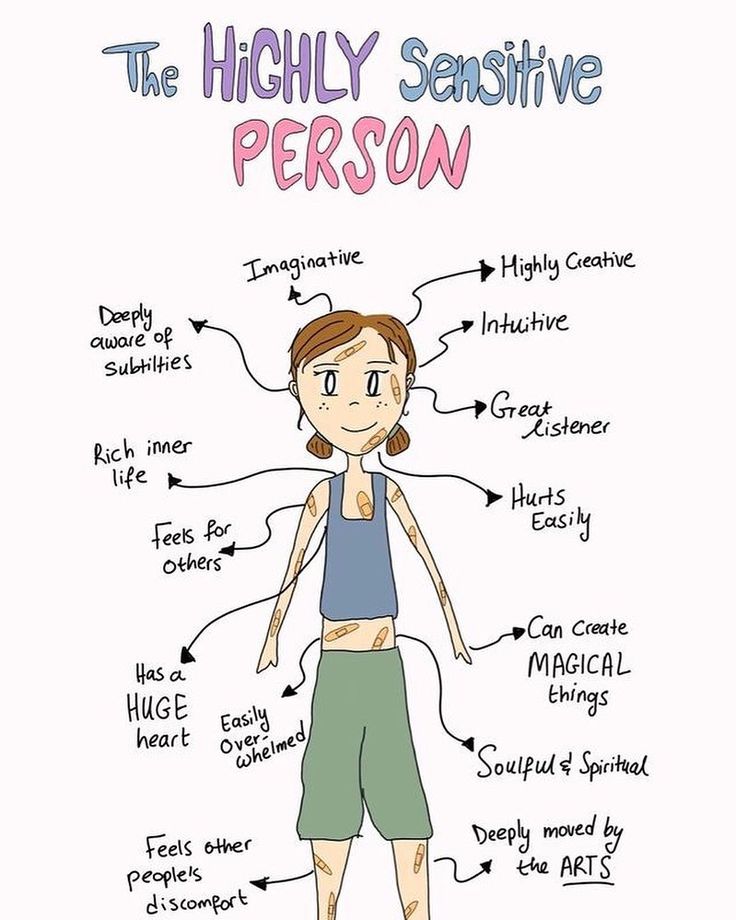 Sometimes you can predict the occurrence of a certain event in advance, understand the state of a person long before he explains it himself, and also recognize true intentions.
Sometimes you can predict the occurrence of a certain event in advance, understand the state of a person long before he explains it himself, and also recognize true intentions.
True, the ability to anticipate something does not always play into your hands, since some images and possible scenarios influence you so strongly that you cannot get rid of obsessive thoughts and emotions. nine0009
Storytel is an international subscription audiobook service. The Storytel library contains audiobooks from almost all genres, from classics and non-fiction to lectures, stand-ups and podcasts. This is a service that solves the problem of reading. It lets you listen to audiobooks anytime, anywhere: while exercising, preparing meals, commuting to and from work, on the plane, before bed, and whenever you want. Storytel creates and records its own unique content - lecture projects, podcasts, audio series, and also collaborates with the best voices in the country. nine0009
Rich inner world and vivid imagination
A wide range of emotions gives rise to various images and associations that can be combined into metaphors, ideas, fantasies and entire worlds.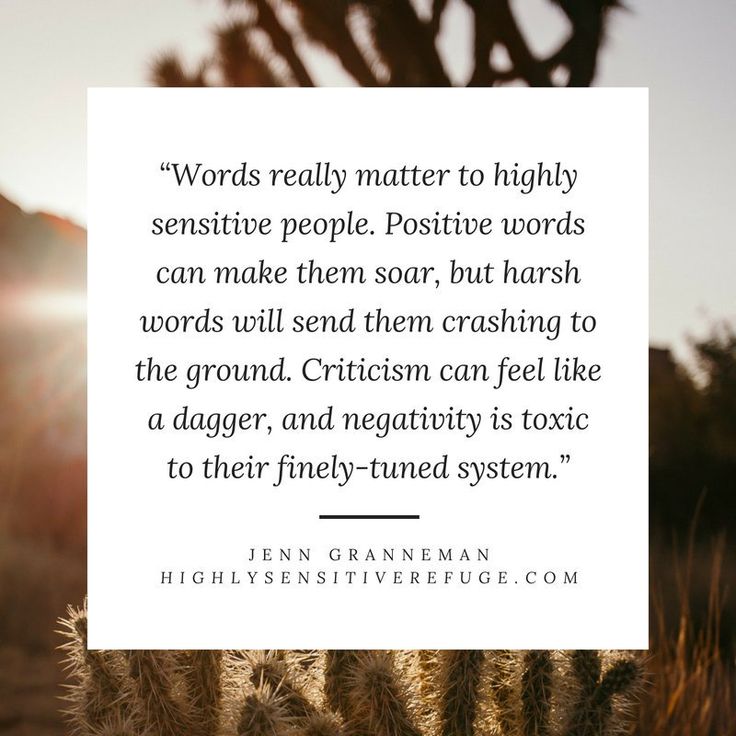 You are probably very inquisitive, prone to constant reflection and searching for answers to questions, therefore you are attentive to the information that you study and to the people with whom you communicate. You may suffer from perfectionism, prone to excessive self-criticism.
You are probably very inquisitive, prone to constant reflection and searching for answers to questions, therefore you are attentive to the information that you study and to the people with whom you communicate. You may suffer from perfectionism, prone to excessive self-criticism.
When you read a book, watch a movie or a theatrical performance, then most likely the rest of the world ceases to exist for you - now there is only a fictional universe that you sensually explore and to which you vividly react. nine0009
Creativity and an existential crisis
Through insight, you may have often thought about the meaninglessness of existence, experienced fear of loneliness, and also annoyance that other people do not want to think about what is really important .
You often get hung up on thoughts about the transience of time and the finiteness of everything that exists, because of this you try to use every moment of life to the maximum, reach creative and career heights.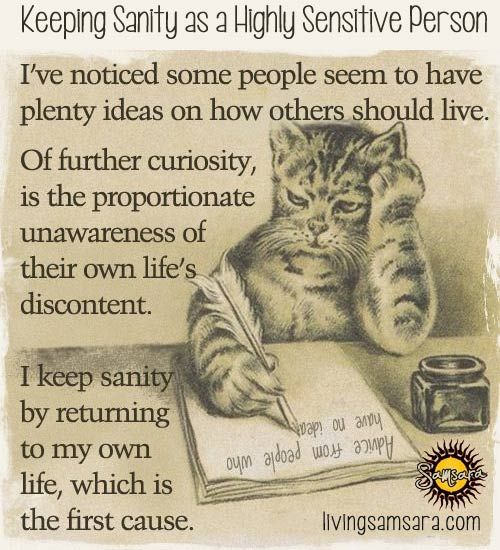 Perhaps you have several hobbies, and you are absolutely not satisfied with the idea of a meaningless life without any goals, aspirations and global desires. nine0009
Perhaps you have several hobbies, and you are absolutely not satisfied with the idea of a meaningless life without any goals, aspirations and global desires. nine0009
Problems of highly sensitive people
A person who perceives the world vividly through feelings is often considered an emotionally immature person, since his reactions to various events seem excessive and inadequate to the situation. This really happens - for example, when it is necessary to resolve a conflict, and instead a person who is overwhelmed by emotions swears even more and does not want to find a way out of the situation.
But why is this happening? By and large, only because until the end of the 20th century, IQ was the only indicator of intelligence and giftedness. However, this coefficient took into account only the abilities of the mind, but did not at all reflect the ability of a person to perceive the world differently - through empathy, the ability to take the place of another, feel the mood of the interlocutor, see his intentions and potential hidden from the eyes of others.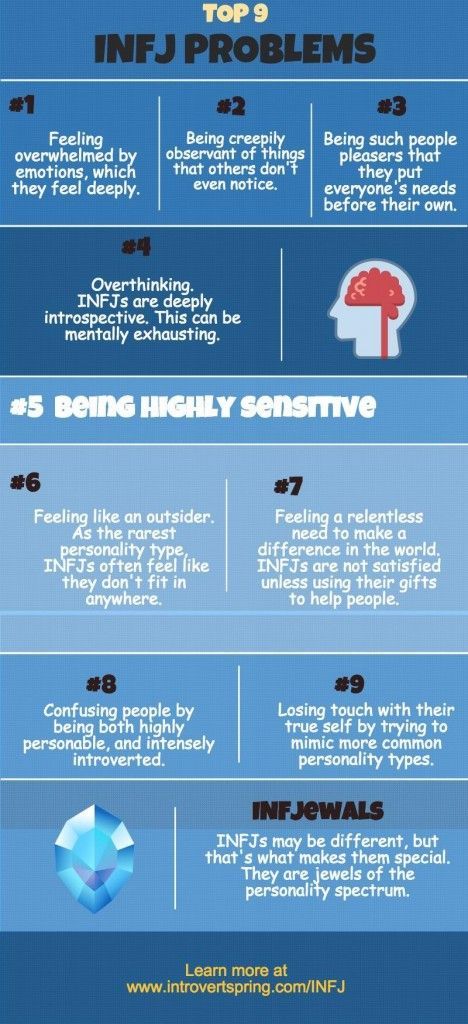 Therefore, in society, it was intelligence, analytical and linguistic abilities that became important, and not emotions and creativity. nine0009
Therefore, in society, it was intelligence, analytical and linguistic abilities that became important, and not emotions and creativity. nine0009
It was only in the 1980s that scientists began to develop new models of giftedness, and this is how emotional intelligence appeared. Canadian psychologist François Gagne was the first to separate the concepts of giftedness and talent in his book The Differential Model of Giftedness and Talent. In his opinion, talent is something that develops over time through training and education, and giftedness is an innate ability, a predisposition to a certain activity. He divided abilities into five categories: intellectual, creative, socio-emotional, sensorimotor and others (psychic abilities are included here, but there may be many questions about them). Only along with this division came the understanding that giftedness is not only intellectual, and a person who does not have sufficient analytical abilities should not be considered stupid or mediocre.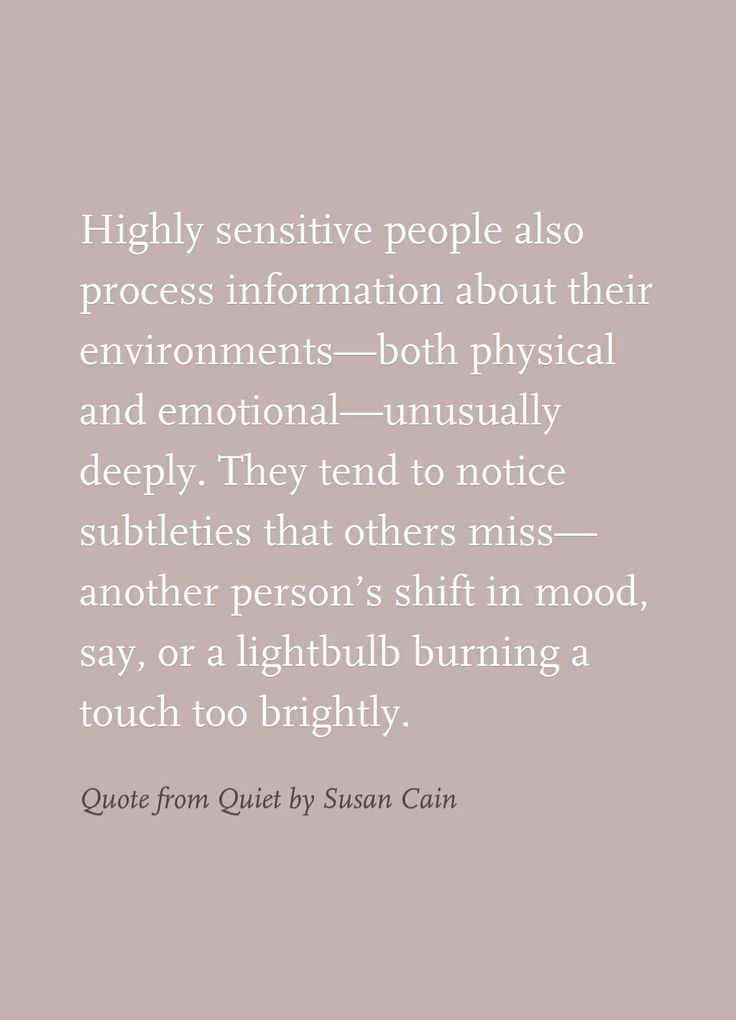 nine0009
nine0009
Around the same time as Gagne, the American psychologist Howard Gardner developed the concept of multiple intelligences, which included, for example, social intelligence - how we build relationships with others - and intrapersonal intelligence - how we perceive ourselves and how inclined to self-reflection.
Despite all the advances in psychology and the active popularization of emotional intelligence, not everyone realizes how important emotions are. It is customary to develop intellect in children, but no one tells them how to perceive the world through the "wisdom of the heart." That is why especially sensitive, gifted children do not receive proper support, stop showing their emotions and, as a result, face a huge number of problems in adult life that result in conflicts, impulsive decisions and the inability to understand themselves and others. nine0009
Storytel is an international subscription audiobook service. The Storytel library contains audiobooks from almost all genres, from classics and non-fiction to lectures, stand-ups and podcasts. This is a service that solves the problem of reading. It lets you listen to audiobooks anytime, anywhere: while exercising, preparing meals, commuting to and from work, on the plane, before bed, and whenever you want. Storytel creates and records its own unique content - lecture projects, podcasts, audio series, and also collaborates with the best voices in the country. nine0009
This is a service that solves the problem of reading. It lets you listen to audiobooks anytime, anywhere: while exercising, preparing meals, commuting to and from work, on the plane, before bed, and whenever you want. Storytel creates and records its own unique content - lecture projects, podcasts, audio series, and also collaborates with the best voices in the country. nine0009
How to deal with it
Truth Time Exercise
If you realize that you are experiencing a lot of emotions and cannot manage them, you are very likely to be trapped in prejudices, old traumas and beliefs that do not allow you to realize all your potential. The purpose of the exercise is to refer to unpleasant past events—for example, family experiences or embarrassing situations in society, among friends, or at work—in which you came to the conclusion that your emotions are wrong, and to understand why you think that sensitivity only bothers you. Here's what you need to do:
-
Take a diary and remember as many painful past events as you can.
 Do you have a tendency to minimize negative feelings? Or, for example, try to separate from your experiences, as if you do not want them to be yours?
Do you have a tendency to minimize negative feelings? Or, for example, try to separate from your experiences, as if you do not want them to be yours? -
Be honest with yourself and remember your childhood. How did your parents react to your sensitivity? Did they support her or, on the contrary, tried to suppress her? Did you receive support when you were sad, and if so, from whom? Could you experience your emotions with loved ones, or did you have to do it alone? nine0009
-
As you remember, pay attention to how your body reacts. Does your heart rate increase when you think about certain situations? Maybe your jaw or shoulders are tense? Emotions tend to show up outwardly, so pay attention to your body's signals.
In the process of this exercise, if you dig deep, it may become clear why you cannot accept and acknowledge your high sensitivity and, as a result, make it work for you. nine0009
Feel the events of the past
Some traumas from early childhood or just in the past can still cause negative feelings in us, such as sadness, anger, sadness or disappointment.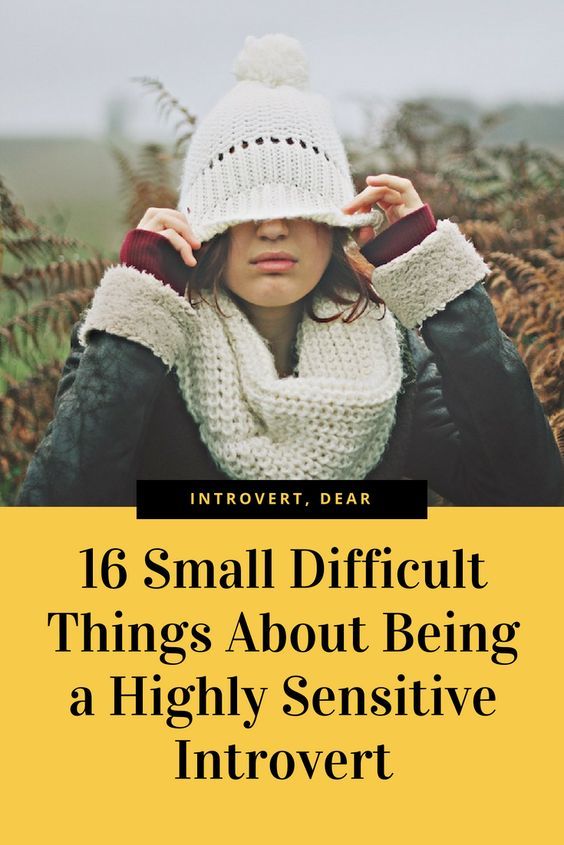 It's okay to experience them, but if the events still seem painful, then you haven't let them go yet. So allow yourself to relive all the emotions, even though it may be unpleasant.
It's okay to experience them, but if the events still seem painful, then you haven't let them go yet. So allow yourself to relive all the emotions, even though it may be unpleasant.
Think of all the situations that make you feel sad, toxic envy, anger or any other negative emotion. Try to feel it all over again, allow yourself to react exactly as you would react if you didn’t forbid yourself to freely express your feelings, even the most unpleasant and negative ones. As in the previous exercise, pay attention to the reaction of the body: is there a lump in your throat, are your cheekbones tense, do you feel like crying? And if so, then allow yourself to feel it all. Re-living emotions is like a way of healing and clearing out what has been bothering you for a long time. When you fully experience everything, it will be easier for you to let go of events and move on. nine0009
Exercise "Mental rehearsal"
When we are nervous, anticipating not the most pleasant or just exciting event, we begin to activate our defense mechanisms in advance so that the situation does not turn into a disaster for us.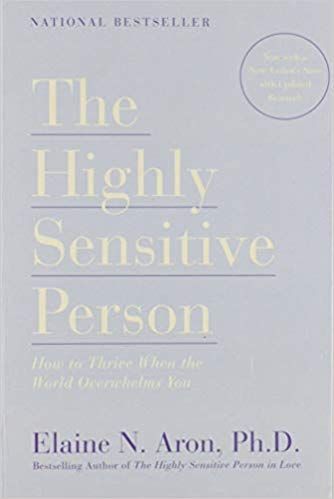 However, by winding ourselves up, we only make things worse, while the event may well turn out to be not as terrible as it seemed at first. To avoid misreactions, do the following:
However, by winding ourselves up, we only make things worse, while the event may well turn out to be not as terrible as it seemed at first. To avoid misreactions, do the following:
-
Imagine an event that triggers your anxiety. Consider it in detail, but not from the point of view of a passive observer, but as an active participant. nine0009
-
Imagine all the possible scenarios in which this event could develop. Will people say things that will make you sad? Or maybe pissed off? Imagine everything that can provoke a strong emotional reaction in you - from the smallest troubles to the biggest.
-
Develop a plan for each option. What do you say if your relative gives unsolicited advice? What “mantra” will help you maintain your composure and not take it out on your loved ones? nine0009
-
Choose the most successful of all the strategies and imagine how you apply them in a particular situation.
-
Imagine all scenarios and solutions.
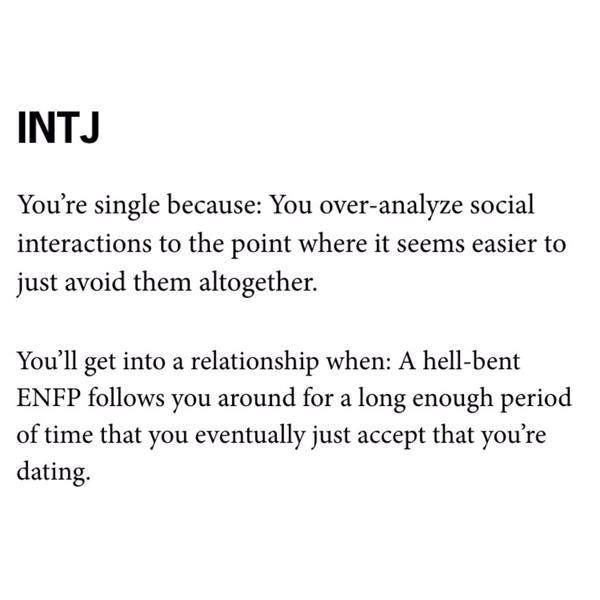 Then you will be more prepared, and emotions will no longer control you, but you will use them for their intended purpose.
Then you will be more prepared, and emotions will no longer control you, but you will use them for their intended purpose.
Building Your Own Altar Exercise
To feel confident alone with your emotions or in company, build a secure base of things, events, and objects that give you confidence and joy. This should include everything that seems stable and comfortable to you. To discover these things, ask yourself a few questions:
-
Analyze past events. What helped you to return to balance when shocking, traumatic events occurred?
-
What morning and evening rituals do you have that give you a sense of stability?
-
What brings you joy?
-
What can you control?
-
What kind of people support you in difficult times? In what ways do you feel confident? nine0009
When you collect all the answers to the questions, you will notice that you do not really face the world alone, and there are things, people and internal mechanisms that allow you to stay afloat and not be at the mercy of emotions so that they it was impossible to control.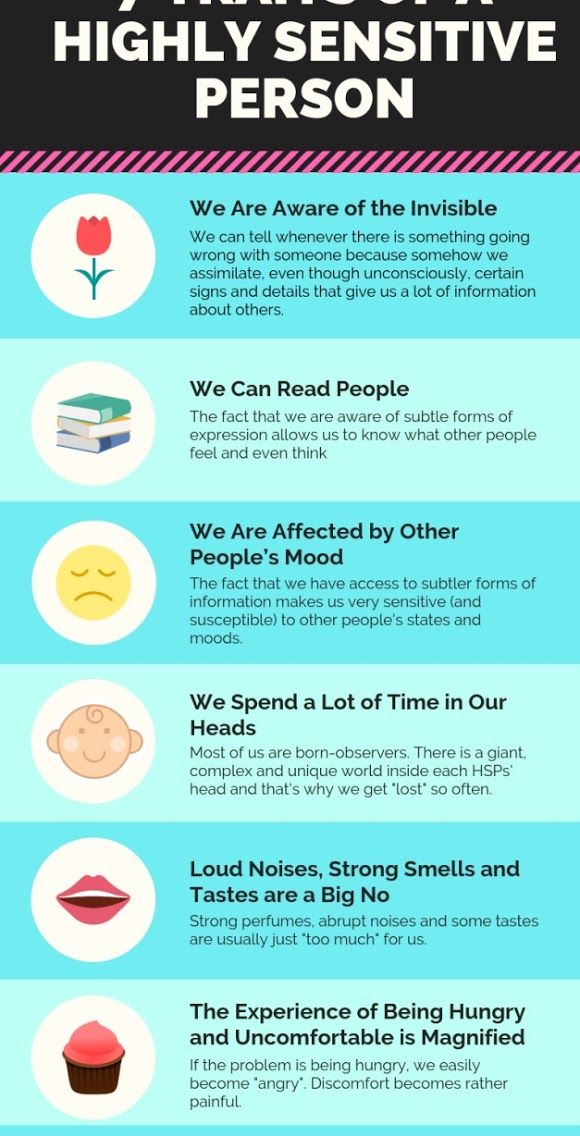
What to do if you are too sensitive. And this is noticeable
Increased emotionality is no longer a sign of weakness - it is a feature of the psyche. The existence of highly sensitive people has been scientifically proven. In a world where more and more people cannot cope with stress, American psychologists are closely studying those who are especially prone to worry about any reason. "Lifestyle" offers to join them. nine0009
If you can't stand bright lights and turmoil around you, you can't watch horror movies, and after watching the news about an earthquake or a military conflict, you start crying out of pity for the victims, you are a highly sensitive person. According to the author of the term Elaine N. Aron, there are about 20% of people like you in the world. This means that it's time to stop hiding your feelings and no longer be ashamed of crying in the movies.
In today's Western world, it's a shame to be a weakling — and that's why we have to hide our feelings, constantly keep in good shape, pretend that we can live without lunch and sleep and work 12 hours a day, otherwise our colleagues will look askance at us , and the authorities - to make jokes about us.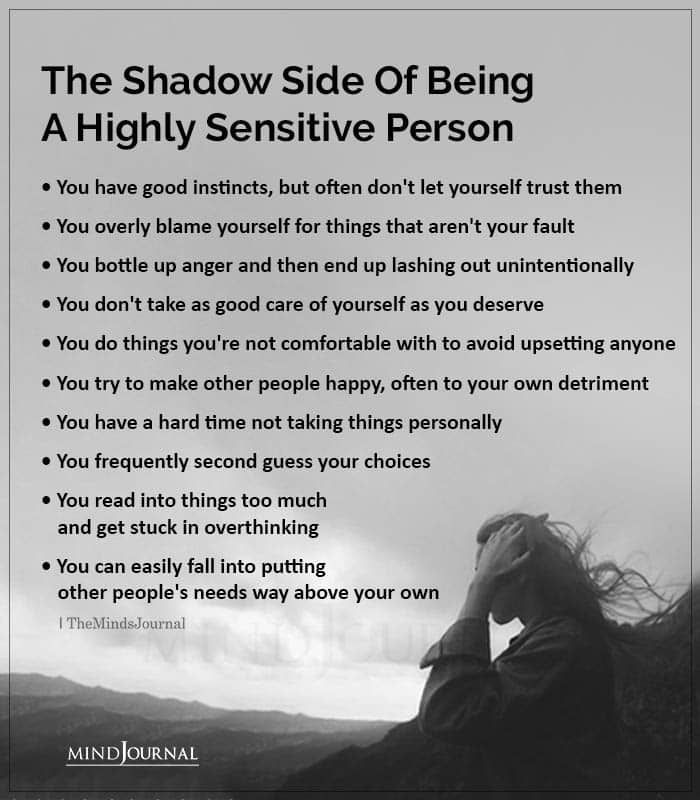 nine0009
nine0009
In our country, it is not customary to be capricious, and that is why we are forced to agree to the conditions that we have, to work in a basement or open space, under the wind of an air conditioner, under the harsh light of fluorescent lamps and under the cries of colleagues from neighboring departments.
close
100%
Are we suffering from all this? Yes, we suffer. In general, we suffer from a lot of things: we can’t stand the feeling of hunger, we can’t watch films about the war, we don’t wear woolen clothes because they prick, we tear off the tags from T-shirts because they get in the way. We cannot work when it is cold, hungry or noisy, we react sharply to criticism and take any comments personally, we catch changes in the mood of others. It remains to say who we are. nine0009
We are highly sensitive people. Do not rush to laugh and call us sissies - and not only because it is very offensive to us.
Perhaps you, too, are one fifth of the world's population, which is characterized by a particularly sensitive processing of sensory information. Then you are one of us.
Then you are one of us.
Perhaps you, too, were forbidden to watch the news program as a child, because they show war and starving children in Africa? Maybe you were dying of shame when a geographer slapped you a deuce once in your life? Maybe they hated running and, in general, any form of competition, when everyone is looking at you, and you run no more than a three? Maybe at school it was a real torment for you to raise your hand in class, even if you knew exactly the right answer? Maybe. Or maybe you have other examples from your childhood that will help you to say that you were a highly sensitive child and probably grew up to be a highly sensitive adult as well. nine0009
The term "highly sensitive person" was first used in its current sense by Dr. Elaine Aron, a scientist and author of The Highly Sensitive Person, published in the United States in 1997. The hypothesis that high sensitivity to external stimuli is a feature inherent in about 20% of the inhabitants of the Earth was put forward by a psychologist twenty years ago.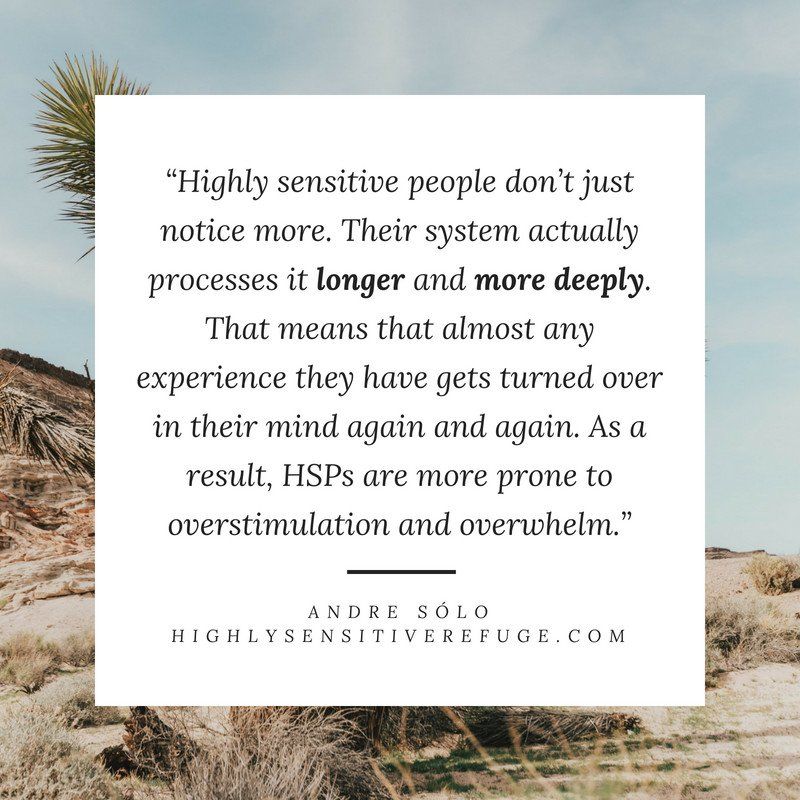
However, the real interest in this idea has awakened among the public only now, when it became clear that more and more people can not cope with stress. nine0009
And I woke up just in time: for twenty years, Dr. Aron and her colleagues have conducted many studies that helped to understand what processes occur in the brain of a highly sensitive person, and to conclude that this feature is innate: certain parts of the brain of such a person react to external stimuli sharper than other, less sensitive people.
And not only negative ones, but also positive ones too. Yes, highly sensitive people feel acute discomfort in awkward situations. But brighter experience the pleasure of contemplating objects of art and views of nature, listening to music, communicating with pleasant people. nine0009
How to know that you are a highly sensitive person
close
100%
1. You have deep feelings
One of the main characteristics of highly sensitive people is the ability to deeply feel what is happening around.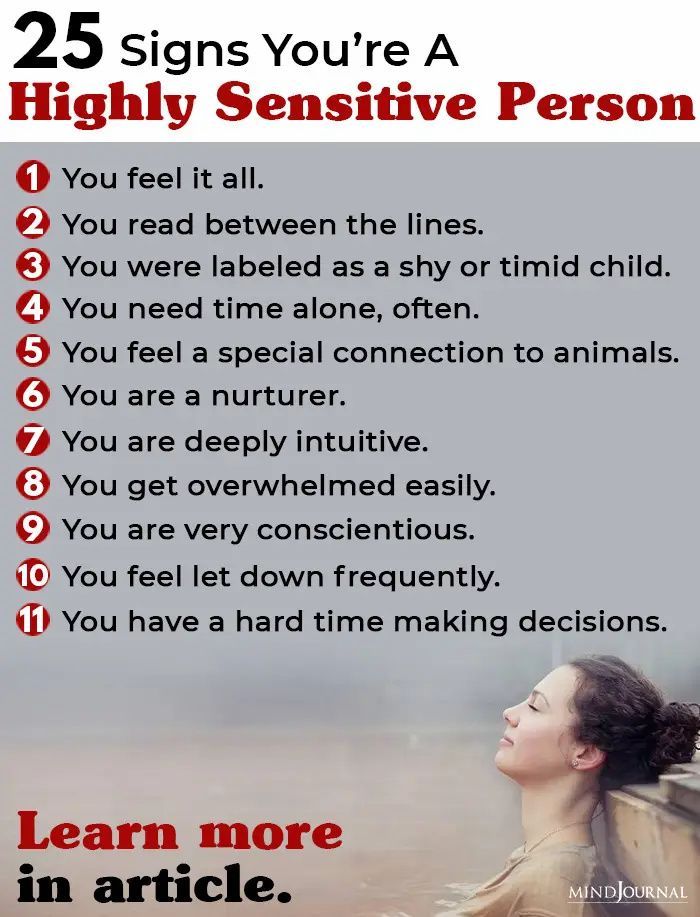 They have developed intuition, which allows them to be more perceptive than their less sensitive comrades.
They have developed intuition, which allows them to be more perceptive than their less sensitive comrades.
2. You react more emotionally than others
Highly sensitive people experience more intense emotions and are often infected by the emotions of others. These are not necessarily close people, they can easily pick up a bad mood from a friend or take care of a colleague's problems. This makes them hate delivering bad news or making unpopular decisions – they worry about how others will react to it. nine0009
3. You are often told: “Don't take it personally.”
Sensitive people are treated differently in different cultures: if in the West emotionality is a manifestation of weakness, then in the East everything is not so simple.
Dr. Ted Zeff, author of The Highly Sensitive Person's Survival Guide, states based on his research that in India and Thailand, sensitive men are very rarely teased, while in North In America, men with a fine mental organization are often the objects of ridicule.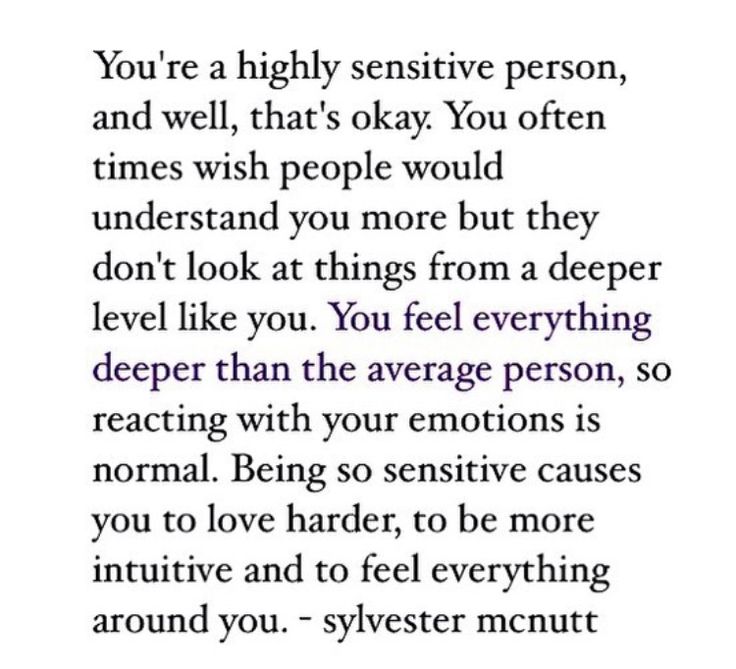 nine0009
nine0009
4. You prefer to exercise alone
Highly sensitive people hate team sports, according to Dr. Zeff. And our experience confirms this: such people like cycling, swimming or walking, but playing football or basketball causes them to panic.
However, there are exceptions: if such a person is lucky with smart and understanding parents, he may not be afraid to prove himself in a team.
5. You find it difficult to make basic decisions
Highly sensitive people are attentive to the details of the situation and the subtleties of circumstances. From this, they try to take everything into account and fall into a stupor, because there is too much of this.
Even the task of choosing an ice cream can confuse them. However, there is good news: having once understood how to behave in a certain situation, in similar conditions in the future, such a person, without getting lost, will immediately do the right thing. nine0009
6. You get upset when you make a mistake
Mistakes upset everyone, but highly sensitive people - especially: because of annoying little things and oversights that others have forgotten to even think about, they can suffer for weeks, imagining that they still remember the mistake.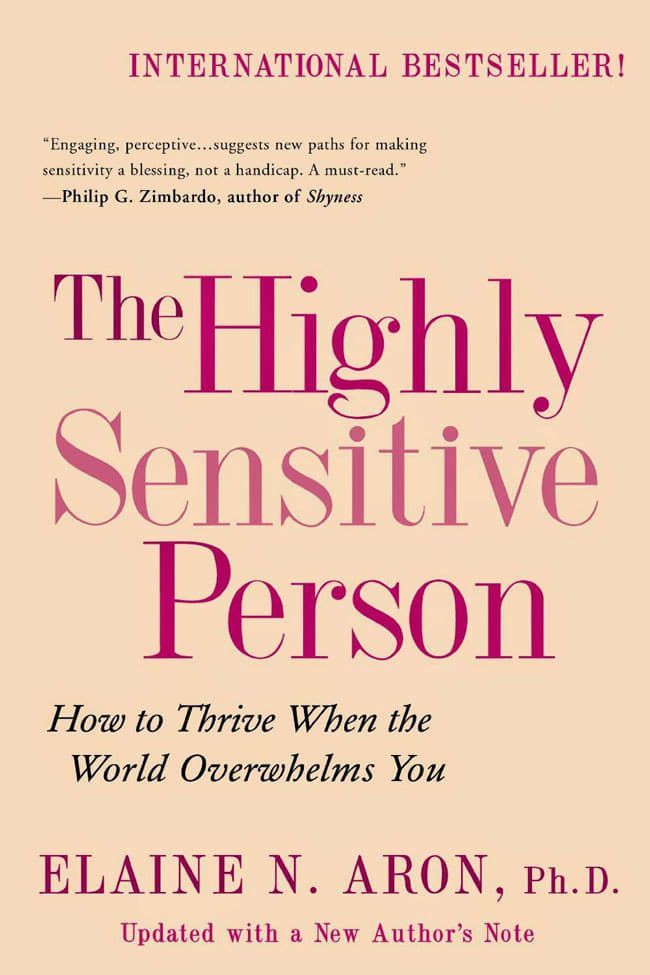
7. You are an introvert
But there are exceptions: according to Dr. Aron, 30% of highly sensitive people are extroverts. This happens when a person grows up in a closed environment where everything is in plain sight, in a village, a small town, a religious community or a family of a public person. nine0009
8. You know how to work in a team
Paradoxically, the depth of experience makes highly sensitive people excellent workers. Only they should not take positions in which they must make final decisions: for example, if it is a doctor, he should have the opportunity to consult with colleagues before prescribing treatment.
9. You are prone to anxiety and depression
This only happens if you have experienced a lot of adversity in the past - but who among us is lucky to do without them at all? Shy people are often teased in childhood: if a highly sensitive person was not given proper support in childhood, he grows up with the feeling that the world is hostile, and only doctors and antidepressants can help here.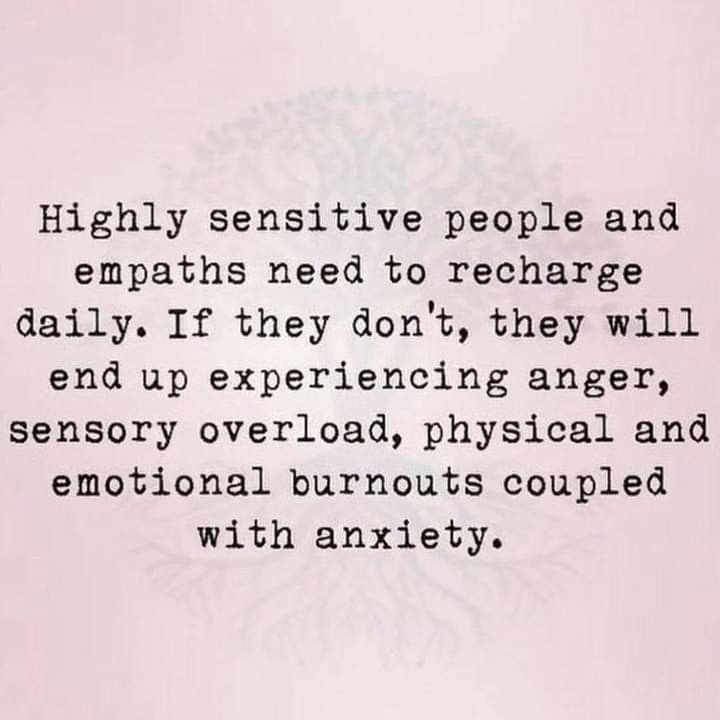 nine0009
nine0009
It is worth taking a closer look at your child: high sensitivity is often inherited.
10. You can't stand sharp sounds
Someone can't stand it when Styrofoam squeaks on glass. Someone - the sound of a perforator or drill. It annoys someone when others eat loudly: champing and smacking is really impossible to endure, why do people even allow themselves to eat with their mouths open ?!
11. You can't see the violence on the screen
A highly sensitive person cannot watch horror films about dismemberment, disaster films about drowning dogs, and arthouse about rape. Lars von Trier, Gaspar Noe and Michael Haneke are cinematic enemies.
Salo by Pier Paolo Pasolini? Look in your VGIK, and it’s enough for us to read the plot.
But you can watch Game of Thrones by closing your eyes in certain places, because the costumes are beautiful.
12. You can cry from scratch
When such a person is hurt to tears for some reason, he is really capable of bursting into tears.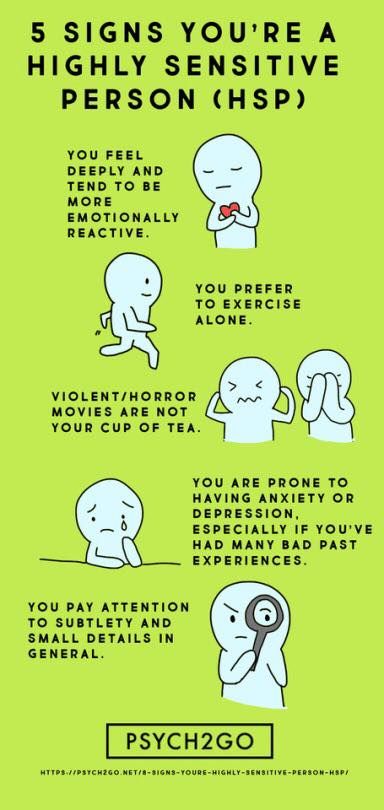 And, by the way, it costs him a lot of effort not to do this. A sad film (without violence), a touching commercial for a charity campaign, a story about a penguin who annually comes to the Brazilian (or Chilean?) who saved him - in general, anything can cause a surge of feelings.
And, by the way, it costs him a lot of effort not to do this. A sad film (without violence), a touching commercial for a charity campaign, a story about a penguin who annually comes to the Brazilian (or Chilean?) who saved him - in general, anything can cause a surge of feelings.
13. You are very polite
Good manners are a hallmark of highly sensitive people: it is important for them not to hurt the feelings of others. They try not to inconvenience others: they regularly give up their seats on public transport, carefully place their carts in the supermarket, let people go ahead, and endlessly apologize and thank you. So sometimes it's even annoying. nine0009
14. You are sensitive to criticism
Highly sensitive people literally cannot stand criticism, taking it to heart. When criticized by their team, they take everything personally.
Because of this, they often use ridiculous defense mechanisms: they try to please everyone in advance, they criticize themselves, they avoid everything that can be a source of criticism.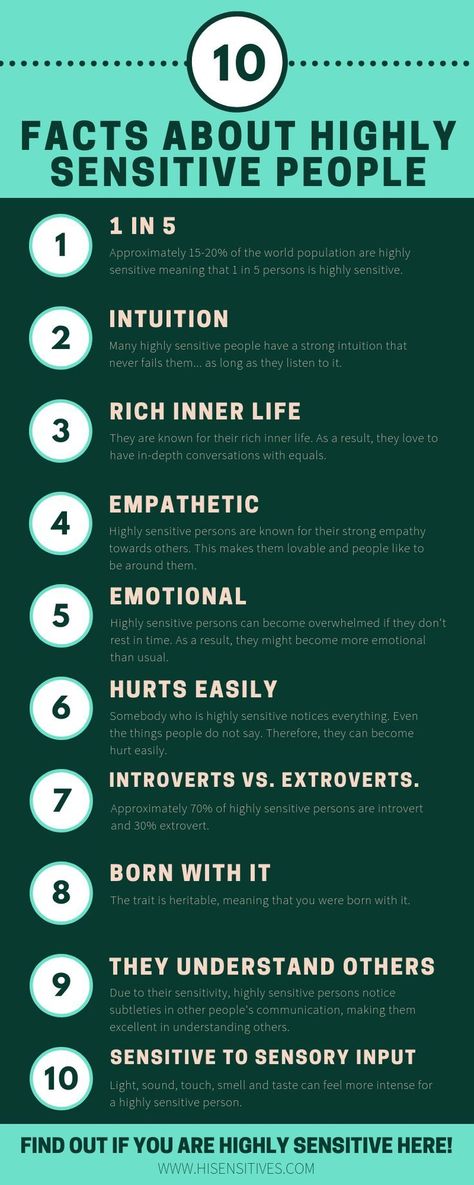
Dr. Aron claims that self-defense such people use the following methods, which may seem strange to most: minimizing contact, blaming, trying to achieve too high a result, resentment, projecting, refusal to compete. nine0009
15. You can’t work in an open office
Open space is a nightmare for any office employee: noise, bright light that not everyone can stand, constant flickering, talking on the phone, arguments and extraneous smells - all this makes you a highly sensitive person's head is spinning, but it does not work out in any way. He is generally incapable of working under pressure: maybe someone needs a good kick to start working, but not for him.
close
100%
10 Rules for a Highly Sensitive Person
1. Remember that you are not alone and that what happens to you is normal.
2. Avoid people you don't like.
3. Avoid situations that make you tired.
4. Don't overload your schedule - otherwise you can fall off at the most inopportune moment.